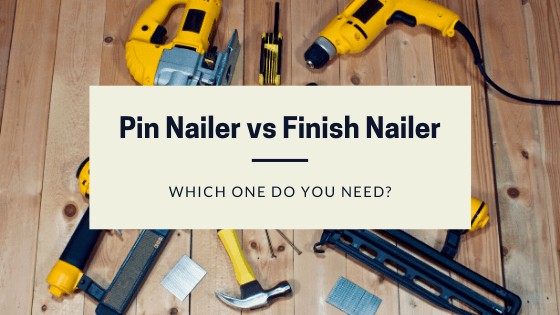For all home renovation projects, finish carpentry is a major part and all the work related to it such as trimming, crown molding, attaching baseboards, window or door casing, trimming etc. can be done easily with the help of a nail gun. Using a nail gun for all these jobs makes them relatively easy, saves your time and keeps your fingers safe from those crazy hammer blows.
Today we are going to discuss two types of nail guns pin and finish nailer which are widely used for different purposes. We will know about them and compare pin nailer vs finish nailer based on their different characteristics to know which is better for which job.
What is a pin nailer?
A pin nailer mostly uses 23-gauge pins which is the smallest diameter of nails. They are mainly headless nails but slight headed nails for a pin nailer are available too. Usually, a quality 23 gauge pin nailer can drive the nail up 1-inch but the top of the line pin nailer can drive up the nails up to 2 inches.
But Pin nailer can use some other gauges like 21 gauges nails too.
What is a finish nailer?
16-gauge and 15-gauge nails are used by a finish nailer and the nails ahave heads. Usually, a finish nailer can drive nails up to 2.5 inches. Bigger nails are used for the 15-gauge finish nailer where its design has an angular variation which helps to put pins to reach tighter spaces. Sometimes they can use 18 gauge nails too. But 18 gauge nails are mainly used by the brad nailer.
Learn more about 16 vs 18 gauge nailers.
Now we will talk about their differences on various factors and find out which is the most suitable for your work.
Finish Nailer vs Pin Nailer: Comparison
Types of nails Used
The nails used for a pin nailer and a finish nailer are very much different. From the above discussion you already know that a pin nailer mostly uses a 23-gauge nail which has a diameter of 0.023 inch or 0.58 millimeter. A finish nailer can use mainly both 16-gauge and 15-gauge nails. A 16-gauge nail has a diameter of 0.0625 inch or 1.588 millimeter and a 15-gauge nail has a diameter of 0.0720 inch or 1.83 millimeter.
Hole sizes
As a finish nailer uses a 16-gauge or 15-gauge nail which is bigger in diameter than a 23-gauge nail used by a pin nailer, the finish nailer create bigger holes than the pin nailer. The major advantage for the pin nailer is that the holes created by it are so tiny that there is no requirement to fill the holes if an application of paint or stain is going to be provided over the finish product. The absent of pin head for pins used by a pin nailer allows you get away without putting putties in pin holes mainly. But some putty are often required to fill the holes created by a finish nailer.
Capacity (Holding power)
Usually pins used by a pin nailer provide almost zero holding power. Most of the time some kind of adhesive or glue is used along with it. On the other hand, a finish nailer provides a lot of holding power through its pins which allow it to be used for various kinds of jobs. So a finish nail art has the ability to withstand a higher payload.
Use
Pin nailers are perfect for delicate jobs such as trimming small pieces, tiny furniture trim. They are often used to withhold a trim until it is glued. They can be used for making toys (wooden), upholstery work too. When there are chances that a larger gauge gun is going to split or break thin and delicate crown molding, veneers then a pin nailer is perfect for the job.
Finish nailers are perfect for different kinds of woodworking are carpentry jobs, installation of trim, molding works etc. Accuracy and precision provided by a finish nailer is very important for these kinds of jobs. Moreover the angular design 15-gauge nail gun allows to put nail in tighter spaces.
Power
Finish nailers are more powerful than pin nailers as they provide more strength and use larger gauge pins. A nail is suitable for delicate works so that the need of power is not necessary for it.
Versatility
Finish nailer is much more versatile than pin nailer as a finish nailer comes handy for a lot of work. As pin nailers are designed for specific and delicate works it comes handy for fixing narrow or thin trims which cannot be done by a finish nailer.
Final Statement
From the above discussion we can clearly see that pin nailers and finish nailers have different characteristics as they are suitable for different sets of work.
Depending on these characteristics you can choose either of them according to your need. We can suggest that if you are doing delicate works then a pin nailer is what you want.
But if you are looking for a nailer that will help you with different kinds of woodworks, finishing works, trimming, picture framing and molding then a finish nailer is your best buddy.
So for you, next major project choose wisely and work efficiently with a finish or a pin nailer.
Related Articles:

 April 19, 2020
April 19, 2020  5 Min
5 Min  No Comment
No Comment 




















